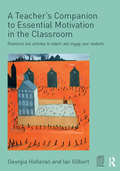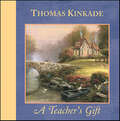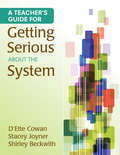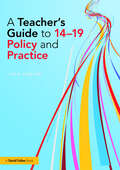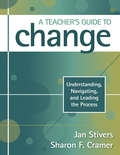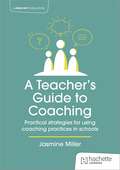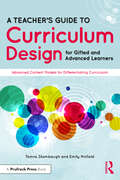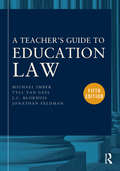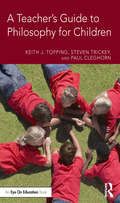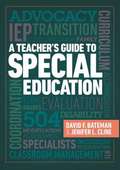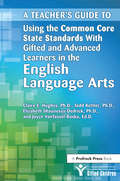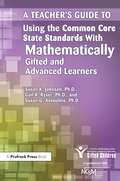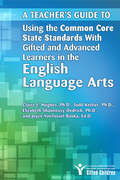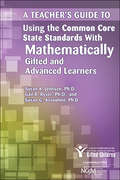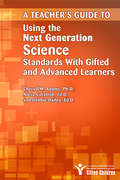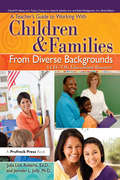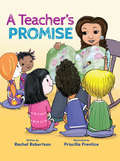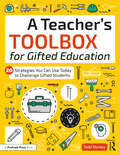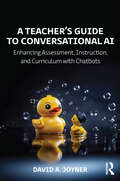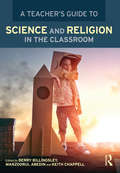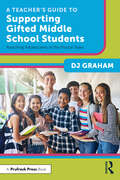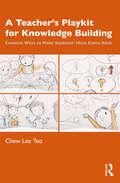- Table View
- List View
A Teacher's Companion to Essential Motivation in the Classroom: Resources and activities to inspire and engage your students
by Ian Gilbert Georgia HolleranTeachers around the world have found Ian Gilbert’s classic text Essential Motivation in the Classroom an inspiring and provocative read. This ground-breaking companion to the book is a definitive one-stop guide for teachers who are looking for inspiration into how his ideas can be put into practice in every-day classrooms. A truly lively and engaging resource, it scrutinises each aspect of Gilbert’s now famous ‘seven keys’ of motivation and provides a wide range of practical ideas, activities and launch-pads for discussion which can be blended seamlessly into your own lessons. Taking as its starting point the right of every child to an inspirational education that develops their values, attitudes and skills, this book provides you with the means to unlock even your most challenging of pupils and will act as a spring board for visionary learning in the classroom and beyond, Key ideas explored include: • Goal setting strategies• Students’ own intrinsic motivation• Preparing effective challenges• Developing multiple approaches to learning • Using physical activities to anchor learning • Helping students to understand themselves better and be better prepared for the world todayFor teachers of pupils at all ages and stages, this book is easy to follow, easy to ‘dip in and out of’, is conversational in tone, and has the potential to be a game-changer for any teacher wishing reinvigorate their pupils, colleagues and classrooms.
A Teacher's Gift
by Thomas KinkadeElbert Hubbard once said, "The teacher is one who makes two ideas grow where only one grew before." True for teachers and students, and true, in a way, for Thomas Kinkade, the well-known painter-communicator who cultivated two ideas-his evocative paintings and the wisdom of teaching-until they grew into a single successful tribute to teachers of all kinds.A Teacher's Gift does an outstanding job of recognizing the value that teachers bring to us all. Whether they work in a formal educational setting, befriend a relative, or mentor a coworker, teachers make a lasting impact on the world. Thomas Kinkade-perhaps with a nod toward his own teachers-uses his paintings to illustrate this collection of thoughts and inspirations from great writers, thinkers, and philosophers, including Benjamin Franklin, Ralph Waldo Emerson, Doris Lessing, Plato, Einstein, and many others. The artist even passes on some teaching wisdom of his own along the way. The combination of these great quotations and Thomas Kinkade's calm and reflective scenes naturally puts the reader in a quiet and serene mood, perfect for recalling teachers of their own and the difference they've made.
A Teacher's Guide for Getting Serious About the System
by D'Ette F. Cowan Mr Stacey L. Joyner Shirley B. BeckwithReal change comes from teachers and administrators working together Educators don’t need another “quick fix” that gives a temporary boost to school performance—they need comprehensive change that lasts. In this brief companion book to Getting Serious About the System: A Fieldbook for District and School Leaders, teachers and other stakeholders will see exactly where they fit in an effective system-wide process of change. They’ll also learn about: The research behind the successful Working Systematically approach The goals of the approach, which include addressing components and competencies at all levels A five-phase process for implementing change at the district, school, and classroom levels
A Teacher's Guide to 14-19 Policy and Practice
by Lynn SeniorThis concise and up-to-date guide to 14-19 education aims to demystify recent policy initiatives in the sector to help teachers and practitioners understand the rationale for the qualifications on offer and support them in their daily practice. Offering lots of additional guidance, it will help teachers to access the ongoing support that is available and develop their own professionalism. A Teacher’s Guide to 14–19 Policy and Practice considers the types of knowledge needed to teach vocational education and offers a wealth of strategies for effective learning, teaching and assessment to ensure that all students achieve and progress. It also explores the ways that teachers can follow the Information, Advice and Guidance (IAG) standards to develop employability in the classroom and help students gain the skills they will need to manage their personal lives and careers in the future. The four sections cover: • The Political Environment in 14-19 Education • Teaching and Learning in the 14-19 Sector • Making 14-19 Work • Going Further in 14-19 Education Featuring case studies, practical tasks and reflective questions, this timely new text will be essential reading for all trainee and practising teachers and practitioners in the 14-19 sector.
A Teacher's Guide to Change: Understanding, Navigating, and Leading the Process
by Sharon F. Cramer Jan L. StiversThis professional development resource provides a step-by-step approach that engages K–12 teachers in learning to prepare for change, which enhances their career satisfaction and professional effectiveness.
A Teacher's Guide to Coaching: Practical strategies for using coaching practices in schools
by Jasmine MillerThis book is for teachers and learning about using coaching skills and practices with children and young people, colleagues, parents, and the wider school community. Research into the area of 'coaching in schools' is still relatively new however, the practice of coaching in schools has been evolving over several decades. This book gives insights into what coaching can look like in schools and is supported by the sharing of experiences by teachers from around the world. It is a book for teachers by teachers, who share how they have used coaching in their classrooms and what they have noticed because of doing so. It is a collation of ideas around the use of coaching approaches and practices in schools for professional and personal development.Through reading this book and trying some of the ideas you will be able to:· Further your understanding of self, both personally and professionally.· Develop coaching practices that support the development of relationships with learners, colleagues, and families.· Expand your toolbox of strategies to engage children and young people in their learning through using different coaching skills.· Develop knowledge of ways to introduce coaching practices and coaching cultures into your classroom, school, and your life.
A Teacher's Guide to Coaching: Practical strategies for using coaching practices in schools
by Jasmine MillerThis book is for teachers and learning about using coaching skills and practices with children and young people, colleagues, parents, and the wider school community. Research into the area of 'coaching in schools' is still relatively new however, the practice of coaching in schools has been evolving over several decades. This book gives insights into what coaching can look like in schools and is supported by the sharing of experiences by teachers from around the world. It is a book for teachers by teachers, who share how they have used coaching in their classrooms and what they have noticed because of doing so. It is a collation of ideas around the use of coaching approaches and practices in schools for professional and personal development.Through reading this book and trying some of the ideas you will be able to:· Further your understanding of self, both personally and professionally.· Develop coaching practices that support the development of relationships with learners, colleagues, and families.· Expand your toolbox of strategies to engage children and young people in their learning through using different coaching skills.· Develop knowledge of ways to introduce coaching practices and coaching cultures into your classroom, school, and your life.
A Teacher's Guide to Curriculum Design for Gifted and Advanced Learners: Advanced Content Models for Differentiating Curriculum
by Tamra Stambaugh Emily MofieldA Teacher’s Guide to Curriculum Design for Gifted and Advanced Learners provides educators with models and strategies they can easily use to create appropriately complex differentiated lessons, questions, tasks, and projects. This must-have resource for both gifted and regular education teachers: Includes specific thinking models for teaching English language arts, social studies, and STEM. Is ideal for teachers who are looking for ways to differentiate and design lessons for their highest achieving students. Provides multiple examples of how to embed complexity within standards-based lessons. Highlights units and models from Vanderbilt University's Programs for Talented Youth curriculum. Helps teachers provide the necessary challenge for advanced learners to thrive. The models have been vetted by content experts in the relevant disciplines and were designed to guide students to develop expertise within a discipline. Definitions of widely used terms, such as depth, complexity, and abstractness, are explained and linked to models within specific content areas to support common understanding and application of schoolwide differentiation strategies.
A Teacher's Guide to Education Law
by Tyll Van Geel Michael Imber Jonathan Feldman J. C. BlokhuisAdapted from its parent volume Education Law, 5th Edition, this accessible text concisely introduces topics in law that are most relevant to teachers. Providing public school teachers with the legal knowledge necessary to do their jobs, A Teacher’s Guide to Education Law covers issues of student rights, discipline, negligence, discrimination, special education, teacher rights, hiring and firing, contracts, unions, collective bargaining, and tenure. Special Features: This revised edition includes new content on bullying, privacy, discrimination, school finance, and issues relating to Internet and technology, as well as updated references and case law throughout. To aid comprehension, technical terms are carefully explained and summaries of key topics and principles are provided. Case law is presented within the context of real-world examples, making this text accessible to pre-service teachers who have little background in law. A companion website provides additional resources for students and instructors, such as links to full cases and a glossary of key concepts.
A Teacher's Guide to Philosophy for Children
by Keith J. Topping Steven Trickey Paul CleghornA Teacher’s Guide to Philosophy for Children provides educators with the process and structures to engage children in inquiring as a group into ‘big’ moral, ethical and spiritual questions, while also considering curricular necessities and the demands of national and local standards. Based on the actual experiences of educators in diverse and global classroom contexts, this comprehensive guide gives you the tools you need to introduce philosophical thinking into your classroom, curriculum and beyond. Drawing on research-based educational and psychological models, this book highlights the advantages gained by students who regularly participate in philosophical discussion: from building cognitive and social/emotional development, to becoming more informed citizens. Helpful tools and supplementary online resources offer additional frameworks for supporting and sustaining a higher level of thinking and problem-solving among your students. This practical guide is essential reading for teachers, coaches and anyone wondering how you can effectively teach philosophy in your classroom.
A Teacher's Guide to Special Education
by David Bateman Jenifer ClineDespite the prevalence of students with disabilities in the general education classroom, few teachers receive training on how to meet these students' needs or how to navigate Despite the prevalence of students with disabilities in the general education classroom, few teachers receive training on how to meet these students' needs or how to navigate the legally mandated processes enumerated in the Individuals with Disabilities Education Act (IDEA). What is their role? What are their responsibilities? What are the roles and rights of parents? And what must all teachers do to ensure that students with disabilities and other special needs receive the quality education they're entitled to? In this practical reference, David F. Bateman--bestselling author of A Principal's Guide to Special Education --and special education administrator Jenifer L. Cline clarify what general education teachers need to know about special education law and processes and provide a guide to instructional best practices for the inclusive classroom. Topics covered include The pre-referral, referral, and evaluation processes Individualized education programs (IEPs) and the parties involved Accommodations for students who do not quality for special education, including those covered by Section 504 Transition from preK to K-12 and from high school to postschool life Classroom management and student behavior Educational frameworks, instructional strategies, and service delivery options Assessment, grades, graduation, and diplomas The breadth of coverage in this book, along with its practical examples, action steps, and appendixes covering key terms and definitions will provide the foundation all K-12 teachers need to successfully instruct and support students receiving special education services. It's an indispensable resource for every general education classroom. the legally mandated processes enumerated in the Individuals with Disabilities Education Act (IDEA). What is their role? What are their responsibilities? What are the roles and rights of parents? And what must all teachers do to ensure that students with disabilities and other special needs receive the quality education they're entitled to? In this practical reference, David F. Bateman--bestselling author of A Principal's Guide to Special Education --and special education administrator Jenifer L. Cline clarify what general education teachers need to know about special education law and processes and provide a guide to instructional best practices for the inclusive classroom. Topics covered include The pre-referral, referral, and evaluation processes Individualized education programs (IEPs) and the parties involved Accommodations for students who do not quality for special education, including those covered by Section 504 Transition from preK to K-12 and from high school to postschool life Classroom management and student behavior Educational frameworks, instructional strategies, and service delivery options Assessment, grades, graduation, and diplomas The breadth of coverage in this book, along with its practical examples, action steps, and appendixes covering key terms and definitions will provide the foundation all K-12 teachers need to successfully instruct and support students receiving special education services. It's an indispensable resource for every general education classroom.
A Teacher's Guide to Using the Common Core State Standards With Gifted and Advanced Learners in the English/Language Arts
by Elizabeth Shaunessy-Dedrick Todd Kettler National Assoc For Gifted ChildrenA Teacher's Guide to Using the Common Core State Standards With Gifted and Advanced Learners in the English/Language Arts provides teachers and administrators a blueprint for differentiating the Common Core State Standards for English Language Arts for gifted and advanced students through the use of acceleration, depth, complexity, and creativity within and across grade levels. It illustrates the differences between learning experiences for typical and advanced students based on the same standard and provides an array of examples across five of the information text and literary text standards while integrating the other aspects of language arts teaching and learning. The book highlights implementation features, such as classroom management and assessment of student work, that allow teachers to make data-based decisions about instruction for particular students. It also offers guidance to teachers on reading selections for advanced learners at all grade levels.
A Teacher's Guide to Using the Common Core State Standards With Mathematically Gifted and Advanced Learners
by Susan Assouline National Assoc For Gifted Children Gail R. RyserA Teacher's Guide to Using the Common Core State Standards in Mathematics provides teachers and administrators with practical examples of ways to build a comprehensive, coherent, and continuous set of learning experiences for gifted and advanced students. It describes informal, traditional, off-level, and 21st century math assessments that are useful in making educational decisions about placement and programming. Featuring learning experiences for each grade within one math progression, the book offers insight into useful ways of both accelerating and enriching the CCSS mathematics standards. Each of the learning experiences includes a sequence of activities, implementation examples, and formative assessments. Specific instructional and management strategies for implementing the standards within the classroom, school, and school district will be helpful for both K-12 teachers and administrators.
A Teacher's Guide to Using the Common Core State Standards with Gifted and Advanced Learners in the English/Language Arts
by Joyce Vantassel-Baska Elizabeth Shaunessy-Dedrick Claire Hughes Todd KettlerA Teacher's Guide to Using the Common Core State Standards With Gifted and Advanced Learners in the English/Language Arts provides teachers and administrators a blueprint for differentiating the Common Core State Standards for English Language Arts for gifted and advanced students through the use of acceleration, depth, complexity, and creativity within and across grade levels. It illustrates the differences between learning experiences for typical and advanced students based on the same standard and provides an array of examples across five of the information text and literary text standards while integrating the other aspects of language arts teaching and learning. The book highlights implementation features, such as classroom management and assessment of student work, that allow teachers to make data-based decisions about instruction for particular students. It also offers guidance to teachers on reading selections for advanced learners at all grade levels.
A Teacher's Guide to Using the Common Core State Standards with Mathematically Gifted and Advanced Learners
by Gail Ryser Susan Assouline Susan JohnsenA Teacher's Guide to Using the Common Core State Standards With Mathematically Gifted and Advanced Learners provides teachers and administrators with practical examples of ways to build a comprehensive, coherent, and continuous set of learning experiences for gifted and advanced students. It describes informal, traditional, off-level, and 21st century math assessments that are useful in making educational decisions about placement and programming. Featuring learning experiences for each grade within one math progression, the book offers insight into useful ways of both accelerating and enriching the CCSS mathematics standards. Each of the learning experiences includes a sequence of activities, implementation examples, and formative assessments. Specific instructional and management strategies for implementing the standards within the classroom, school, and school district will be helpful for both K-12 teachers and administrators.
A Teacher's Guide to Using the Next Generation Science Standards with Gifted and Advanced Learners
by Cheryll Adams Alicia Cotabish Debbie DaileyA Teacher's Guide to Using the Next Generation Science Standards With Gifted and Advanced Learners provides teachers and administrators with practical examples of ways to build comprehensive, coherent, and rigorous science learning experiences for gifted and advanced students from kindergarten to high school. It provides an array of examples across the four domains of science: physical sciences; Earth and space sciences; life sciences; and engineering, technology, and applications of science. Each learning experience indicates the performance expectation addressed and includes a sequence of activities, implementation examples, connections to the CCSS-Math and CCSS-ELA, and formative assessments. Chapters on specific instructional and management strategies, assessment, and professional development suggestions for implementing the standards within the classroom will be helpful for both teachers and administrators.
A Teacher's Guide to Working With Children and Families From Diverse Backgrounds: A CEC-TAG Educational Resource
by Jennifer Jolly Julia Link RobertsSchools are increasingly diverse in their student population, presenting new challenges for teachers. In light of these challenges, schools remain important in the talent development process. A Teacher's Guide to Working With Children and Families From Diverse Backgrounds provides important information and strategies for educators at all levels. The book is written for educators who want all children to thrive in school, including those who are twice-exceptional, those from lower income backgrounds, and others who have been underrepresented in gifted programming.
A Teacher's Guide to Writing Workshop Essentials: Time, Choice, Response
by Katherine Bomer Corinne Arens*How can I get started with writing workshop, or refine my workshop? *What are the essential elements of a writing workshop? *How can I create daily structures and routines that support writers? In this foundational guide, Katherine Bomer and Corinne Arens describe the elegant simplicity of a Writing Workshop focused on just three essentials―time, choice, and response. Based on the research-based belief that children learn to write best when we provide a predictable, daily structure for writing, Katherine and Corinne introduce teachers to the rituals and routines of writing workshop and suggest ways to take small, incremental steps toward implementing them. Shared from the viewpoint of two veteran educators who understand the issues and obstacles teachers face day to day, A Teacher’s Guide to Writing Workshop Essentials also serves as a refresher for experienced workshop teachers looking for a chance to refocus, clarify, and extend the work in their practice. If your teaching has become more complicated and more focused on curriculum than on the writers sitting in front of you, if you’re not sure what your students really need to support them as writers, or if you’re just not sure how to get started with Writing Workshop, this guide is for you.
A Teacher's Promise
by Rachel Robertson Priscilla PrenticeIn every classroom, there is a person who cares about the way children learn, grow, and feel--the teacher! <P><P>The affirming verses and fanciful illustrations in A Teacher's Promise express what all teachers wish for the children they teach--that they develop self-confidence, perseverance, curiosity, and an enjoyment of learning. This book can help ease fears children might have about joining a new classroom or child care setting.Rachel Robertson is vice president of learning and development at Bright Horizons.Priscilla Prentice is also the illustrator of When You Just Have to Roar!
A Teacher's Toolbox for Gifted Education: 20 Strategies You Can Use Today to Challenge Gifted Students
by Todd StanleyThis book provides busy teachers with an adaptable toolbox of strategies for challenging gifted students that they can immediately put into practice in their classroom, school, or program. Chapters cover everything from makerspaces and project-based learning, to enrichment clubs, mentorships, creative thinking, and more. Each strategy includes an overview, resource guide, description of how it looks in the classroom, and all the information you need to put it into practice. With templates, charts, and links to videos illustrating the tools in action, A Teacher’s Toolbox for Gifted Education is your go-to guide for creative ways to support advanced learners.
A Teachers' Guide to the Special Educational Needs of Blind and Visually Handicapped Children
by Sally S. MangoldSuggestions and ideas from educational officials on how to provide additional support to blind students in the classroom setting.
A Teacher’s Guide to Conversational AI: Enhancing Assessment, Instruction, and Curriculum with Chatbots
by David A. JoynerA Teacher’s Guide to Conversational AI explores the practical role that language-based artificial intelligence tools play in classroom teaching, learning experiences, and student assessment. Today’s educators are well aware that conversational and generative AI—chatbots, intelligent tutoring systems, large language models, and more—represent a complex new factor in teaching and learning. This introductory primer offers comprehensive, novice-friendly guidance into the challenges and opportunities of incorporating AI into K-12 schools and college classes in ways that are appropriate, nourishing to students, and outcomes-driven.Opening with an informative overview of the foundational properties, key terminology, and ethical considerations of these tools, the book offers a coherent and realistic vision of classrooms that are enhanced, rather than stymied, by AI systems. This includes strategies for:· designing assessments that are conducive to students’ beneficial use of AI while mitigating overreliance or dishonesty;· using AI to generate lesson examples for student critique or custom content that reinforces course principles;· leveraging chatbots as a co-instructor or a tutor, a guide during student-driven learning, a virtual debate or brainstorming partner, and a design project; and· creating course content, lesson plans and activities, expanded language and accessibility options, and beyond. Through the depth of understanding and applied approach provided in these chapters, teachers and leaders in training and in service, alongside private tutors, college instructors, and other educators, will be better prepared to future-proof their efforts to serve new generations of learners.
A Teacher’s Guide to Science and Religion in the Classroom
by Berry Billingsley Manzoorul Abedin Keith ChappellA Teacher’s Guide to Science and Religion in the Classroom provides practical guidance on how to help children access positive ways of thinking about the relationship between science and religion. Written for teachers of children from diverse-faith and non-faith backgrounds, it explores key concepts, identifies gaps and common misconceptions in children’s knowledge, and offers advice on how to help them form a deeper understanding of both science and religion. Drawing on the latest research as well as the designs of successful workshops for teachers and for children, there are activities in each chapter that have been shown to help children understand why science and religion do not necessarily conflict. The book highlights children’s interest in the so-called "Big Questions" that bridge science and religion and responds to the research finding that most children are missing ideas that are key to an explanation of why science and religion can be harmonious. The book explores key concepts and ideas including: Nature of science Power and limits of science Evolution, genes and human improvement Miracles, natural disasters and mystery Profiles of scientists, including Galileo and Newton A Teacher’s Guide to Science and Religion is an essential companion for preservice and practising teachers, providing session plans and pedagogic strategies, together with a cohesive framework, that will support teachers in fostering children’s curiosity and enthusiasm for learning.
A Teacher’s Guide to Supporting Gifted Middle School Students: Reaching Adolescents in the Pivotal Years
by DJ GrahamA Teacher’s Guide to Supporting Gifted Middle School Students provides insight to help you gain a better understanding of your gifted students during a pivotal time in their development. Employing pop culture, personal stories, and prompts for reflection, this text considers major factors impacting gifted middle school students including self-image, the need for differentiated content, the importance of slowing down, the value of mentors, and ways to instill hope during this ‒ more often than not ‒ difficult time. Full of practical examples for how you can work to address both the academic and social-emotional needs of your students, this book champions middle school as an important time for selfdiscovery and developing passions. Engaging and informative, this inspiring new book is a “must read” for all teachers seeking to positively influence their students during this unique and critical time in their lives.
A Teacher’s Playkit for Knowledge Building: Creative Ways to Make Students’ Ideas Come Alive
by Chew Lee TeoDelving into the journey of teachers and students in the knowledge building classroom, Teo’s playkit offers practical approaches to making classrooms a place of knowledge creation. Teo highlights the potential and possibility of idea-centric discourse and interactions in Singapore’s high-performing education system while offering a trilogue among researchers, teachers and students: the agents of a knowledge building environment in classrooms. Documenting case examples of knowledge building lessons in relation to the curriculum design and pedagogical decisions and moves, as well as the formative assessment, the book focuses on those 21st-century practices embedded within the knowledge building process. It comprises a series of teachers’ journeys in different subjects and grades, demonstrating the depth and breadth of projects that students are capable of pursuing in class when they are entrusted to work with their own ideas and questions. It also offers a collection of concrete tools and strategies for teachers to use to support knowledge building work. The different case examples support teachers in their design effort and will encourage the community of researchers and educators to continue to imagine the possibilities of pedagogical educational reform. Written for practitioners, this playkit aims to engage the wider community of teachers to play with their own lesson ideas as they engage their students in knowledge creation.
